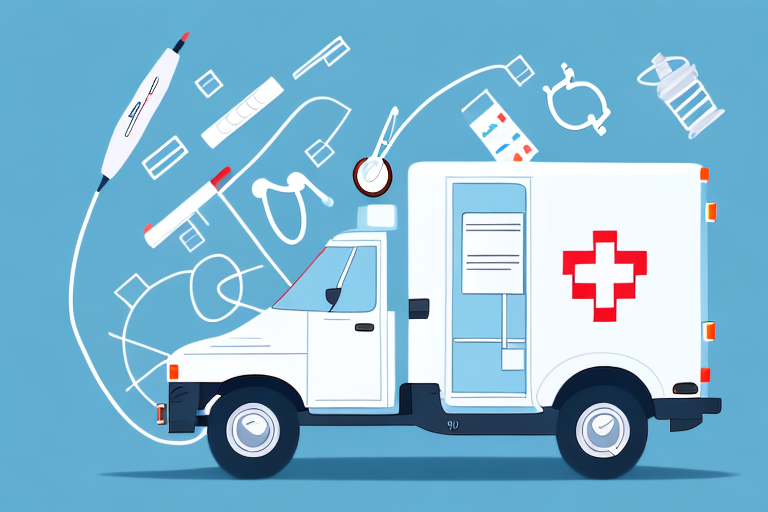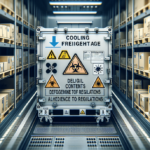Understanding the Medical Courier Industry
Responsibilities of a Medical Courier
The medical courier industry plays a crucial role in the healthcare system by transporting medical specimens, equipment, and supplies between hospitals, laboratories, clinics, and other healthcare facilities. As a medical courier, your primary responsibility is to ensure the safe and timely delivery of these items while maintaining their integrity. This includes maintaining the appropriate temperature for sensitive specimens, using proper packaging materials, and handling medical waste safely.
According to the U.S. Food and Drug Administration (FDA), the transportation of medical specimens must comply with strict guidelines to preserve their quality and validity for diagnostic purposes.
Compliance with HIPAA Regulations
Medical couriers must adhere to the Health Insurance Portability and Accountability Act (HIPAA) regulations, which protect patient privacy and ensure the secure handling of sensitive medical information. This includes safeguarding patient data during transportation, ensuring that only authorized personnel have access to medical materials, and maintaining confidentiality throughout the delivery process.
Failure to comply with HIPAA can result in significant fines and legal consequences, making it essential for medical couriers to undergo proper training and implement robust security measures.
Legal and Licensing Requirements
Legal Requirements for Starting a Medical Courier Business
Starting a medical courier business involves several legal steps, including registering your business as a legal entity (such as an LLC or corporation), obtaining an Employer Identification Number (EIN) from the IRS, and complying with local, state, and federal regulations. It is advisable to consult with a legal professional to ensure all legal requirements are met.
Licenses and Permits Needed
Depending on your location, you may need specific licenses and permits to operate a medical courier business. Common requirements include a general business license, a hazardous materials (HAZMAT) permit if transporting biohazardous waste, and a commercial driver's license (CDL) with a hazardous materials endorsement for drivers. Always check with your local regulatory bodies to identify the necessary permits for your area.
For more detailed information, refer to the U.S. Department of Transportation (DOT) guidelines.
Insurance Requirements
Insurance is a critical component of a medical courier business. Essential insurance policies include:
- General Liability Insurance: Protects against claims related to property damage, personal injury, or other liabilities.
- Commercial Auto Insurance: Covers vehicles used for business purposes.
- Workers’ Compensation Insurance: Required if you have employees, covering workplace injuries and illnesses.
- Professional Liability Insurance: Also known as errors and omissions insurance, it covers claims related to professional mistakes or negligence.
Consult with an insurance broker to determine the best coverage options for your specific business needs.
Training and Education for Medical Couriers
Mandatory Training Programs
Many states and healthcare facilities require medical couriers to undergo specific training programs. These programs typically cover:
- Proper handling and transportation of medical specimens
- Temperature control for sensitive materials
- HIPAA compliance and patient privacy laws
- Emergency response procedures
- Defensive driving techniques
Organizations such as the National Association of Allied Cargo and Research (NAACCR) offer certification programs that can enhance your credibility and ensure compliance with industry standards.
Ongoing Education and Certification
Continuing education is vital to stay updated with the latest regulations and best practices. Regular training sessions and certification renewals help maintain high standards of service and compliance.
Operational Best Practices
Packaging and Transporting Medical Supplies
Proper packaging is essential to maintain the integrity of medical supplies during transit. Use specialized packaging materials such as insulated containers for temperature-sensitive items and biohazard bags for medical waste. Ensure all packages are clearly labeled with necessary handling instructions and documentation.
According to the Centers for Disease Control and Prevention (CDC), using appropriate packaging materials and following regulatory guidelines is crucial for preventing contamination and ensuring the safety of both the couriers and the recipients.
Choosing the Right Vehicles
Selecting the appropriate vehicles for your medical courier business is critical. Consider factors such as:
- Temperature Control: Refrigerated vehicles for perishable specimens
- Capacity: Adequate space for equipment and supplies
- Reliability: Regular maintenance to prevent breakdowns
- GPS Tracking: Real-time tracking for efficient route management
Tracking and Monitoring Deliveries
Implementing a robust tracking system is essential for managing deliveries in real-time. Use GPS tracking software to monitor vehicle locations, optimize routes, and provide clients with accurate delivery status updates. Real-time tracking enhances accountability and improves customer satisfaction by ensuring timely and secure deliveries.
Platforms like Geotab offer advanced fleet management solutions that can be integrated into your operations.
Business Planning and Management
Developing a Comprehensive Business Plan
A well-structured business plan is the foundation of a successful medical courier business. Your business plan should include:
- Market Analysis: Understand the demand, competition, and target audience
- Financial Projections: Estimate startup costs, operating expenses, and revenue forecasts
- Operational Strategy: Define your service offerings, delivery routes, and logistics
- Marketing Plan: Outline strategies for attracting and retaining clients
- Staffing Plan: Determine the number of employees needed and their roles
A detailed business plan not only guides your operations but also attracts potential investors and lenders.
Managing Operations and Logistics
Efficient management of daily operations is crucial for maintaining service quality and operational efficiency. Key aspects include:
- Scheduling and routing deliveries to minimize delays
- Maintaining accurate records of all shipments
- Inventory management for medical supplies and equipment
- Implementing logistics software to streamline processes
Utilizing technologies like Logistics Management Systems can enhance your operational efficiency and reduce costs.
Marketing and Client Relations
Effective Marketing Strategies
Developing a strong marketing strategy is essential for attracting clients and growing your business. Key strategies include:
- Creating a professional website optimized for search engines (SEO)
- Utilizing social media platforms to reach a broader audience
- Implementing email marketing campaigns targeting healthcare providers
- Networking with industry professionals and attending healthcare conferences
- Offering introductory discounts or referral incentives
According to HubSpot, businesses that prioritize inbound marketing strategies are 13 times more likely to see positive ROI.
Building Relationships with Healthcare Providers and Clients
Strong relationships with healthcare providers and clients are the cornerstone of a successful medical courier business. Focus on delivering exceptional customer service, maintaining reliability, and being responsive to client needs. Regular communication, timely deliveries, and addressing any issues promptly will help build trust and foster long-term partnerships.
Scaling Your Medical Courier Business
Expanding Services and Markets
As your business grows, consider expanding your service offerings and entering new markets to increase revenue streams. This can include:
- Offering specialized services such as emergency deliveries or 24/7 operations
- Expanding geographically to cover entire states or multiple regions
- Partnering with additional healthcare facilities and laboratories
- Incorporating advanced technologies like automated routing and AI-driven logistics
Scaling should be approached strategically to ensure that your operations can handle increased demand without compromising service quality.
Tips for Sustainable Growth
To achieve sustainable growth, focus on:
- Investing in scalable technologies and infrastructure
- Continuously training and developing your workforce
- Monitoring financial performance and adjusting strategies accordingly
- Maintaining high standards of compliance and customer service
According to the Small Business Administration (SBA), businesses that plan for scalability are better positioned to manage growth effectively and remain competitive in the market.
Conclusion
Starting a medical courier business requires careful planning, adherence to regulations, and a commitment to excellence in service delivery. By understanding the industry, meeting legal requirements, investing in proper training, and implementing best practices, you can build a successful and reputable medical courier service. Continuous learning, effective marketing, and strategic growth will ensure your business meets the evolving needs of the healthcare sector while providing invaluable support to healthcare providers and patients alike.




















